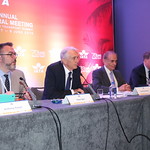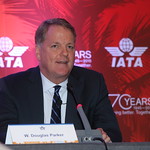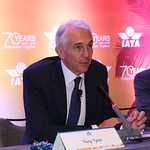Good morning. I don’t want to repeat the remarks that I have just made in my Report on the Air Transport Industry. But, before I take your questions, I would like to highlight a few key issues.
The Outlook
You will have seen the outlook announcement for today. We expect the industry as a whole to generate some $29.3 billion in net profit this year. And for the first time in our records (possibly in history) the airline industry as a whole will earn its cost of capital. This is positive news.
What’s changed the industry’s fortunes? Many assume that the fall in fuel prices was the main driver. Of course it has helped. But the 20% appreciation in the US dollar has moderated this to a very large degree for many airlines. And a significant amount of the fuel spend is hedged at higher than market level. The strongest driver of improved profitability is efficiency. This year we expect airlines to fill 80.2% of their seats—a record high load factor that shows how much progress has been made in fine-tuning and focusing the business.
The second element of the outlook that I must ask your special attention to is the fact that the industry’s performance is far from uniform. Some airlines are doing well. North American carriers are contributing over half of the industry’s profit—about $15.7 billion. But many airlines are still facing huge challenges. Overall, even though $29.3 billion may seem like a large number, it is on revenues of $727 billion. So it is a hard-earned 4.0% net profit margin.
To illustrate even further the contrasting realities, look at what airlines will be making on a per passenger basis which is on average $8.27. Some are doing better than that. Those in North America will make more than double that--$18.12. The Middle East carriers will also do better than the industry average with a per passenger profit of $9.30. In contrast, the average European carrier will make $6.30 per passenger. In Asia Pacific it is $4.24. And for Latin America and Africa it is $2.27 and $1.59 respectively.
It is a good year for the industry, running an airline is still a very tough business.
Governments
Many of the challenges that the industry faces center around the role that governments are playing. I highlighted that in my remarks to the AGM.
- I called on governments to implement smarter regulation, singling out the proliferation of consumer protection regimes as a good place to start. These are not harmonized across borders and often do more harm than good for the consumer that they are meant to protect. Smarter Regulation encourages governments to work with industry to build regulations which are aligned with global standards, proportional, well-targeted, fair and clear about what is expected. The result should stand-up to rigorous cost-benefit analysis and with a minimal compliance burden.
- We also need governments to provide cost-efficient infrastructure in ample supply to meet growing demand. While that is an easy sentence to say, a look around the world shows many deficiencies. It is difficult to see any real progress in the Single European Sky. And, according to Eurocontrol, Europe is headed for a 12% shortfall in airport capacity by 2035. Hong Kong is enhancing its great airport, but needs convincing to keep its charging regime cost-effective. The Gulf has great airports but the skies are increasingly crowded and costs are rising. And here in the US, the debate on corporatizing the provision of air navigation services has the potential for a real improvement—provided that it is done correctly.
- And on security, we see many positive efforts moving towards a risk-based model. The US pre-check program is a great example. But security and border control remain as pain points. And they will only get ironed out if governments coordinate across borders.
If I summarize all of that, our message to governments is about deepening our partnership. We must work together with a common understanding of the need for Smarter Regulation, cost-efficient infrastructure to enable connectivity and a risk-based approach to security. If we can achieve all that, it will be a major step forward. The air transport industry will be stronger. And the benefits that it can deliver as an economic catalyst will be that much more potent.
And just before I open for your questions, I would highlight one government that is willfully hindering aviation’s ability to meet the needs of its economy and putting its connectivity at risk. That is Venezuela. In the next session I will discuss this further in the formal setting of the AGM. But I wanted to highlight to the press that Venezuela continues to block some $3.7 billion of airlines’ money from repatriation. This is unacceptable. Venezuela is thus contravening its international obligations. And it must stop.
The country’s severely difficult economic situation is not an excuse to delay addressing the issue. I call on the immediate intervention of the Venezuelan government in three areas: - To end differential exchange rates. Airlines should be able to sell tickets and pay their bills with the same exchange rate.
- To work with the industry to agree a payment plan that can be realistically achieved.
- And to consult with the industry before imposing any new regulations—financial or otherwise
With that, I will open up for your questions.


